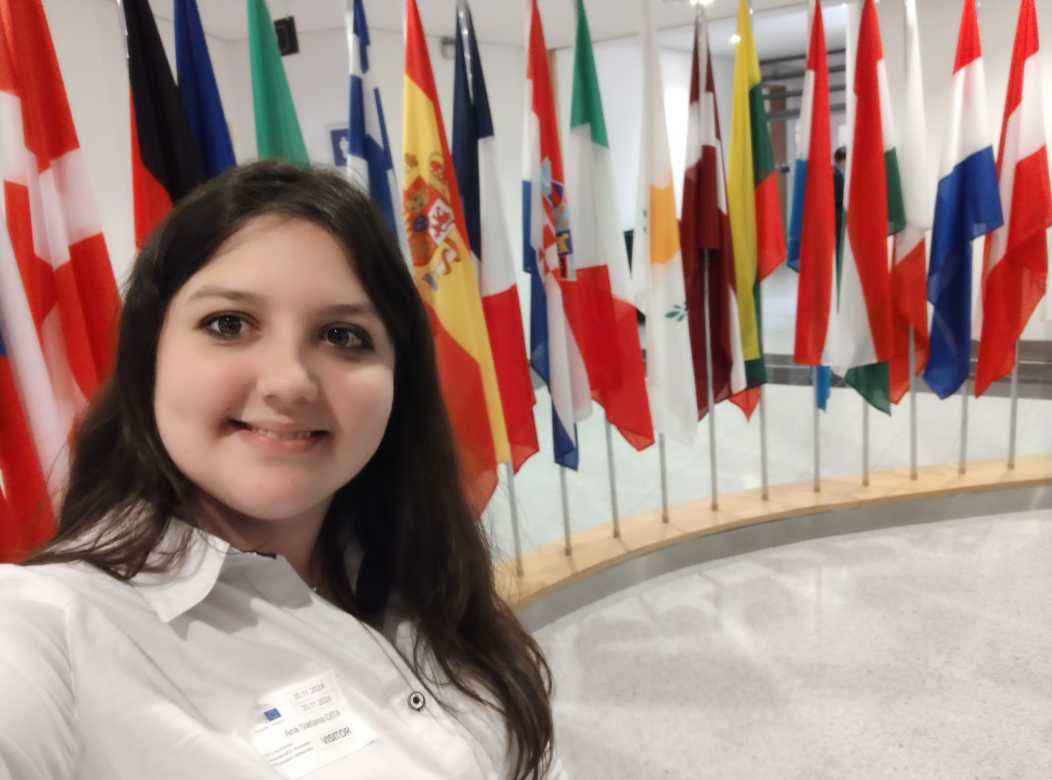But, do you see a change in you after you started this project?
I’m much more enthusiastic now and I have much, much, much, much more hope that things can change. Well, to be honest, I’ve always been an incredible optimist and I’ve believed many times in my crazy ideas. But, when you see that people around you believe in the same crazy ideas you have, you get courage and you don’t feel so alone in a whirlpool of confusion.
Of course, when I started this project, I started it through the European Solidarity Corps, because it’s an option that sometimes Europe offers to people, especially young people, to start from somewhere. And that’s how I used it. I wanted to start from somewhere.
This whole idea with the people I had around me and, again, who believed in me, even if at the beginning it was a bit confusing for them and for me. But, just because I started from somewhere, through the project that the European Union has already created for us young people, it gave me courage and it practically determined to me that now I have this mission. How do I get it to the end?
And by the end, it means that I have to talk to other people, to talk to other NGOs. I’ve decided to go to school, so I have to talk to the teachers, to the students, to other bodies that exist in our society and that could interact with my project in one way or another. And, until now, I didn’t necessarily have closed doors.
They were like, ok, we’ll leave them open, we’ll see later when it’s clearer. Which, again, gives me courage and makes me understand that it’s no longer such a taboo subject, or even if it is, it’s not something that we run away from, that we don’t hear about, that we don’t want, it doesn’t exist. And that’s it, again, it gives me courage and it makes me believe that it can be more than an extremely fanciful dream of mine.
What’s your plan for the future?
I like, now, in general, when I think about the future, I like to look either too far or too close. I’m the man of extremes sometimes.
And I’d like to have an answer that is palpable and that effectively answers your question, namely that, of course, I want to bring this project to an end and your project to be just the beginning of what Be Inclusive wants to be. To be practical, if you will, as a kind of cast hole of the entire orchestra that it can become. And by orchestra I mean that there are many, many stakeholders that I didn’t even know I could use in the cast hole advantage that I support.
And that’s why I like to believe that it’s like music, like art, after all. So, in the end, when this project will come to an end, it will just be the beginning of a mission that I hope will last my whole life. More than that, now I started going to school and to see how children react when they interact with the empathy exercises that I do and how they see the world through the shoes of others.
And again, besides the jokes and laughs, I’m convinced that somewhere deep in their minds there will be some questions that they will either answer now or later in time or they will at least have an experience that will encourage them when they find a disabled person not to be afraid to interact with them. And the most important thing is that I’m proposing now, in July, to make a festival for accessibility and inclusion. And this festival is basically proposing to be an oasis of inclusive culture and to be realized through different plays, through disabled musicians, through artists with disabilities, but also through inclusive and accessible workshops.
For example, to make movements together using inclusive techniques, how we can integrate people in different activities with or without disabilities. But without feeling that it’s a discussion between us or you. Because, in general, when we observe the tendency towards inclusive workshops, we focus strictly on a category of disabilities or strictly on people with disabilities and we don’t let others interact with us or vice versa.
And I think it’s important, because society is made up of all of us, to bring everyone to the same place just to discuss, to look left and right, to see, ah, this is how it’s done, ah, this is how it feels, and all these things. Because you can’t explain to a person who doesn’t go through that disability or that life experience, you can’t explain it just through abstract things, just through texts on paper that he reads or doesn’t, but the inter-human experience that he can have in such an environment, I think it’s much more valuable than hundreds of books or articles that any of us would read. So, I would conclude by saying that I want to bring a new movement in Romania, in the way in which we celebrate disabilities, but also in the way in which we interact and become friends with what this universe means.
